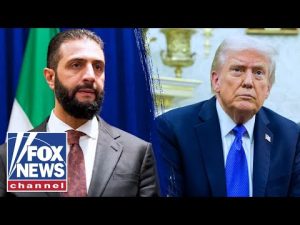In an unexpected twist of global diplomacy, President Trump has rolled out the red carpet at the Oval Office for Syria’s leader Ahmed al-Shahraa, a man with a past colorful enough to rival a Hollywood action baddie. Once the head of an al-Qaeda-affiliated group, al-Shahraa’s meeting with President Trump represents a significant shift in U.S.-Syria relations. It’s safe to say eyebrows were raised as Shahraa, who previously lived most comfortably on the U.S. government’s wanted list, was shown around the White House like an old friend.
The historic meeting supposedly marks an era of new strategies between the two nations. Al-Shahraa claims it’s a move to pull Syria out of decades of isolation and build new bridges with the United States. Their chat allegedly focused on investment opportunities rather than the grievances of the past, which seems like an interesting topic when your guest’s CV includes a stint as a renowned terrorist leader. But, maybe it’s just another day at the office for the president to think sky’s the limit for potential economic partnerships in the Middle East, terror history be put aside.
There was talk of Syria partnering with the U.S. in fighting ISIS—you know, the group both countries have allegedly had their run-ins with. Al-Shahraa shared how his forces have suffered, losing many in their clashes with ISIS. It’s a relief to know, perhaps with the idea that the friend of my enemy is my frenemy, that both nations are thinking beyond the bullet-ridden past and onto greener investment pastures. Maybe this is what they call modern diplomacy—playing basketball with military heroes and being gifted a MAGA hat as a souvenir of state visit success.
But let’s address the elephant in the Oval Office: al-Shahraa’s ties with al-Qaeda and the burden of a past full of regrettable affiliations. According to Shahraa, that’s old news. He reminded everyone he was merely 19 during the infamous attacks and was uninvolved from his far-off position. Interesting that this chapter of his life isn’t weighing too heavily on the talks about potential future investments and sanctions being lifted. Selective memory, perhaps, but at least he offered a vague agreement that civilian lives lost were indeed mourned—a sentiment we all undoubtedly share.
Finally, let’s not forget the complex web of Middle East politics. The idea of Syria jumping onboard the Abraham Accords sounds like a diplomatic puzzle. With Israel, Syria’s longstanding historical “frenemy” occupying the Golan Heights, al-Shahraa wasn’t exactly jumping at negotiation prospects. Yet, despite the intricate history and land disputes, there may be potential for negotiations stirred by the current U.S. administration. Certainly, if President Trump’s diplomacy continues in this direction, we may all need to buckle up for more eyebrow-raising political surprises in the future.







